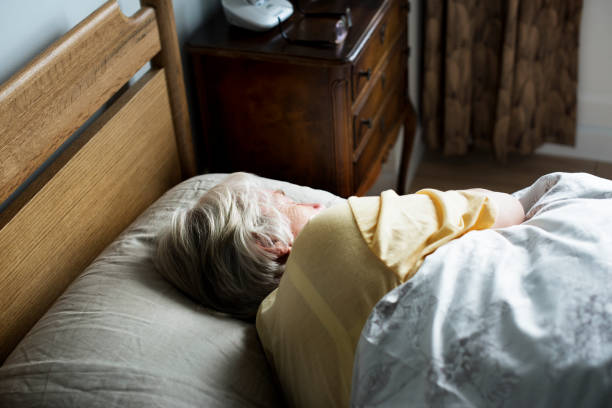Sleep is fundamental to maintaining health and well-being, yet many seniors struggle to achieve the quality rest they need. Sleep patterns often change as we age, making getting a full night of restorative sleep more challenging. Home health care can play a significant role in helping seniors establish healthier sleep routines and maintain overall wellness.
Contents
- 1 Understanding Sleep Changes in Seniors
- 2 Common Sleep Issues Faced by Seniors
- 3 How Poor Sleep Affects Senior Health
- 4 The Role of Home Health Care in Improving Sleep
- 5 Practical Tips for Seniors to Improve Sleep
- 6 Encouraging Communication with Health Providers
- 7 A Holistic Approach to Sleep Wellness
- 8 Wrapping Up
Understanding Sleep Changes in Seniors
Aging brings various changes to the body, including alterations in sleep patterns. Seniors tend to experience lighter, shorter sleep cycles, leading to more frequent awakenings throughout the night. Many older adults also find it difficult to fall asleep or stay asleep, often due to physical discomfort, medical conditions, or the side effects of medications.
These changes can result in sleep deprivation, which negatively impacts physical and mental health. Sleep deprivation in seniors is associated with increased risks of chronic conditions such as hypertension, diabetes, heart disease, and cognitive decline.
Common Sleep Issues Faced by Seniors
There are numerous reasons why seniors may struggle with sleep. Identifying the cause is the first step in improving sleep quality. Some of the most common sleep issues among older adults include:
- Insomnia: Difficulty falling or staying asleep.
- Sleep Apnea: Breathing interruptions that cause frequent awakenings.
- Restless Legs Syndrome (RLS): Uncomfortable sensations in the legs, leading to the urge to move.
- Chronic Pain: Conditions such as arthritis can make lying down uncomfortable.
- Medications: Some prescriptions may cause wakefulness or disrupt sleep cycles.
- Mental Health Concerns: Anxiety and depression can interfere with sleep quality.
Recognizing these challenges allows home health care providers to create personalized strategies for better sleep management.
How Poor Sleep Affects Senior Health
Insufficient sleep in seniors can lead to a range of health problems. Beyond physical discomfort and fatigue, poor sleep can weaken the immune system, making it harder for the body to fight off infections. It can also affect mental health, leading to increased feelings of anxiety, mood swings, and even depression.
Moreover, sleep disturbances can impact cognitive functions, including memory and concentration. This can be particularly concerning for seniors who are already at risk for age-related cognitive decline. In the long term, sleep issues may increase the likelihood of falls and accidents due to decreased alertness and coordination.
The Role of Home Health Care in Improving Sleep
Home health care can be vital in addressing seniors’ sleep challenges. Caregivers and health professionals can assess sleep patterns, monitor underlying health issues, and create tailored interventions. Here are some of the ways home health care can help improve sleep quality for seniors:
- Personalized Sleep Routines: Caregivers can help establish consistent sleep schedules that align with the senior’s natural circadian rhythms.
- Medication Management: Health care professionals can review and adjust medications that may be disrupting sleep.
- Pain Management Support: Addressing chronic pain through physical therapy or medication adjustments can promote more comfortable and restful sleep.
- Mental Health Care: Addressing anxiety or depression through counseling or support groups can significantly reduce sleep disturbances.
- Diet and Lifestyle Guidance: Encouraging a balanced diet and physical activity can promote healthier sleep patterns.
Practical Tips for Seniors to Improve Sleep
In addition to professional support, seniors can adopt practical habits to enhance their sleep quality. Here are some effective strategies:
- Establish a Bedtime Routine: Going to bed and waking up simultaneously each day can help regulate the body’s internal clock.
- Create a Sleep-Friendly Environment: A quiet, dark, and cool room can help you fall and stay asleep.
- Limit Caffeine and Alcohol: Both substances can interfere with sleep, especially if consumed close to bedtime.
- Stay Active: Light physical activities during the day can promote more restful sleep at night.
- Practice Relaxation Techniques: Gentle stretching, deep breathing, or meditation can help unwind before bed.
Home health caregivers can assist seniors in incorporating these habits into their daily routines, ensuring consistency and support.
Encouraging Communication with Health Providers
Seniors and their families must communicate about sleep issues openly with health care providers. A detailed sleep diary can help track patterns and pinpoint problems. By discussing sleep quality during routine medical visits, seniors can receive guidance on lifestyle changes, medications, or therapies that can promote better rest.
Home health care professionals can facilitate these discussions by monitoring sleep patterns, noting any irregularities, and advocating for the senior’s well-being during medical appointments.
A Holistic Approach to Sleep Wellness

Addressing sleep issues in seniors requires a holistic approach that considers physical, mental, and lifestyle factors. Home health care plays an essential role in this process by offering continuous support and personalized care strategies.
By prioritizing quality sleep, seniors can enhance their physical health, mental clarity, and overall quality of life. With the support of compassionate caregivers, they can experience more restful nights and better days.
Wrapping Up
Quality sleep is crucial for seniors to maintain their health and independence. While sleep disturbances are common in older adults, they are not an inevitable part of aging. Home health care can make a meaningful difference by addressing the underlying causes of sleep problems and implementing practical, individualized solutions.
For families and caregivers, being proactive about sleep wellness can significantly improve a senior’s quality of life. By fostering healthy sleep habits and seeking professional support, seniors can enjoy the restorative rest they deserve.

